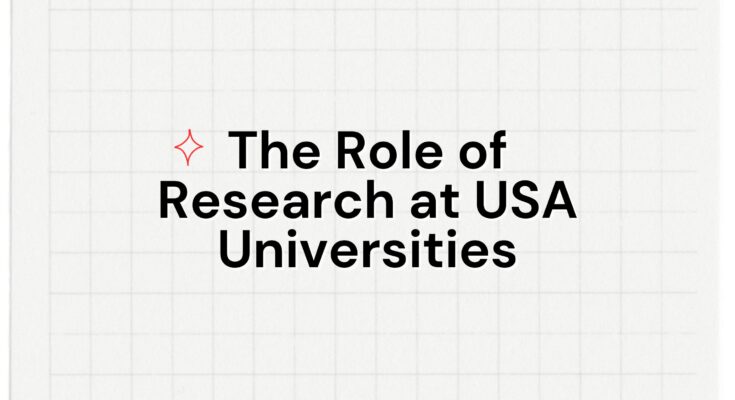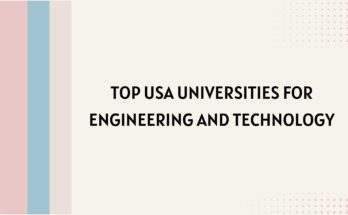Research stands as the cornerstone of progress in academia, particularly at universities in the United States. Renowned worldwide for their cutting-edge discoveries and contributions across various disciplines, American universities play a pivotal role in shaping global knowledge and innovation. This blog post delves into the multifaceted significance of research within the vibrant academic landscape of the USA.
The Role of Research at USA Universities
Fostering Innovation and Discovery
At the heart of every major breakthrough lies rigorous research conducted at universities. Institutions such as Stanford, MIT, Harvard, and UC Berkeley are renowned for their groundbreaking research across fields like technology, medicine, social sciences, and beyond. These universities attract top talent from around the globe—students, researchers, and faculty alike—who collaborate in pushing the boundaries of knowledge.
Innovation thrives within the dynamic research environments of American universities due to several factors:
- Interdisciplinary Collaboration: Research hubs within universities encourage collaboration among experts from diverse fields. For instance, biomedical engineers might collaborate with computer scientists to develop cutting-edge medical technologies.
- Access to Resources: Universities invest significantly in state-of-the-art laboratories, libraries, and computing facilities. This access to resources empowers researchers to explore bold ideas and pursue ambitious projects.
- Industry Partnerships: Many universities forge partnerships with industry leaders, fostering a fertile ground for translating research into real-world applications. These collaborations often lead to the commercialization of inventions and technologies.
Driving Economic Growth and Competitiveness
Research conducted at US universities drives economic growth through several channels:
- Job Creation: Innovation stemming from university research often spawns new industries and startups, creating jobs and boosting local economies. Silicon Valley, for instance, owes much of its dynamism to research-intensive universities like Stanford and UC Berkeley.
- Patents and Licensing: Universities contribute significantly to the nation’s intellectual property portfolio. Patents resulting from university research can be licensed to companies, generating revenue that supports further research endeavors.
- Attracting Investment: Research excellence attracts investment from both public and private sectors. Venture capitalists, attracted by promising research outcomes, often invest in startups emerging from university labs.
Addressing Societal Challenges
Beyond economic impact, research at US universities addresses pressing societal challenges:
- Healthcare and Medicine: Medical breakthroughs, such as new treatments and diagnostic tools, emerge from university research. Institutions like Johns Hopkins University are pivotal in advancing healthcare through research in areas like cancer treatment and infectious diseases.
- Environmental Sustainability: Universities conduct research aimed at mitigating environmental impacts and developing renewable energy sources. Initiatives range from climate modeling to innovations in clean technology.
- Social Sciences and Policy: Research in fields like sociology, economics, and political science informs policy decisions and addresses social inequalities. Institutions like Harvard University’s Kennedy School of Government influence public policy globally.
Global Impact and Collaboration
US universities are global hubs for collaboration and knowledge exchange. International researchers and students flock to these institutions, enriching the research landscape with diverse perspectives and expertise. Collaborative research initiatives span continents, tackling global challenges such as climate change, pandemics, and food security.
Challenges and Future Directions
Despite its many successes, US university research faces challenges:
- Funding Uncertainty: Uncertain federal funding poses a risk to long-term research projects. Universities rely on grants from agencies like the National Institutes of Health (NIH) and National Science Foundation (NSF).
- Ethical Considerations: As research advances, ethical dilemmas arise—such as those surrounding genetic engineering or artificial intelligence—that necessitate careful consideration and regulation.
Looking ahead, the future of research at US universities promises continued innovation and impact. Emerging fields like quantum computing, artificial intelligence, and biotechnology will likely shape the next wave of breakthroughs. Moreover, universities are increasingly emphasizing the importance of diversity, equity, and inclusion in research, ensuring that all voices contribute to solving global challenges.
Conclusion
In summary, research at US universities serves as a catalyst for innovation, economic growth, and societal progress. These institutions not only foster academic excellence but also drive discoveries that benefit humanity as a whole. As we navigate the complexities of the 21st century, the role of research in American universities remains indispensable, shaping a brighter future through knowledge, collaboration, and relentless curiosity.
Through its unwavering commitment to pushing the boundaries of human knowledge, research at US universities stands poised to tackle the challenges of today and tomorrow, leaving an indelible mark on global progress.



